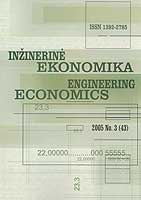Factors Impacting Offshore Company Activities after the EU Enlargement
Factors Impacting Offshore Company Activities after the EU Enlargement
Author(s): Vaidas Gaidelys, Vytautas Snieška, Andrius GuzavičiusSubject(s): Economy
Published by: Kauno Technologijos Universitetas
Keywords: offshore centres; Europe Union.
Summary/Abstract: The article deals with the offshore centre activities in the European Union economic area and their role in the international trade. The offshore centre activities are analyzed taking into account the offshore companies registered in the former colonies of the European Union member-states. The changes in activities of the offshore companies registered on the territory of the European Union are examined within the context of the European Union enlargement. There is no clearly and officially stated position of the European Union governing bodies on the offshore centres and on the real assumptions on their process development non-conformities. The new European Union member-states have had to limit the activities of the offshore centres that were established on their territories including Cyprus, Malta, Hungary and others. It should be noted that the offshore centre in Cyprus had been very popular among Russian businessmen until Cyprus became a member of the European Union. In spite of that, some of the European Union member-states have preserved the opportunity to use offshore centres that were established on the non-European Union territories. Both in Lithuania and Latvia, the offshore centres that are registered in various states of the USA like Delaware, Wyoming, Kentucky, are still very popular. According to the Lithuanian legal acts, these offshore centres are not considered to be the territories where the tax rates are lower than in Lithuania and the tax tariff of 29 per cent is not applicable to them. The rapid development of the US operating offshore centres has been observed by other authors who claim that the majority of the offshore companies were registered in the Caribbean Sea region and the Western European states. Alongside these regions, the offshore jurisdiction zone has been expanding in the states of the Asia/Pacific region. Objective of the article – analyze factors impacting the activities of the offshore centres after the enlargement of the European Union. Although the official position of the European Union towards offshore centres and their activity is negative, some states of the European Union establish offshore centres in their territories. Being the members of the EU states, Lithuania businessmen enjoy favourable conditions to carry out their activities through the offshore centres registered in the USA. Having analyzed the entrance time of various states into the OECD organization, the conclusion may be drawn: new members are accepted to this organization paying no attention to the fact whether the state has already established the offshore centre in its territory or not before joining the OECD organization. Among offshore centres, that are to undergo sanctions, there are states that do not belong to the Organization of Economic Development and Cooperation. Furthermore, this is acts as the mean to reduce competition among offshore centres.
Journal: Engineering Economics
- Issue Year: 2006
- Issue No: 1 (46)
- Page Range: 38-44
- Page Count: 7
- Language: English

